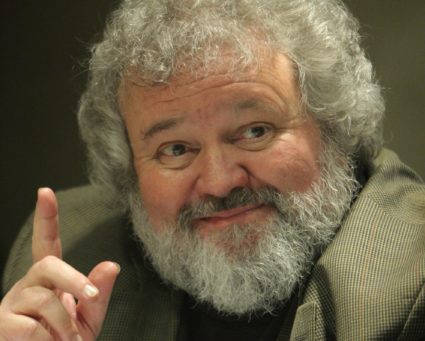
Oscar-nominated cinematographer of 'E.T.,' 'Bugsy' dies at 77
LOS ANGELES — Cinematographer Allen Daviau, who shot three of Steven Spielberg's films including "E.T. The Extra-Terrestrial," has died. A representative from the American Society of Cinematographers said Wednesday that Daviau died Tuesday of complications from COVID-19. He was 77.
A five-time Oscar nominee, Daviau was also behind the camera on "Empire of the Sun," "Bugsy," "The Color Purple," "Avalon" and "Defending Your Life."
Spielberg said in a statement that, "Allen was a wonderful artist but his warmth and humanity were as powerful as his lens. He was a singular talent and a beautiful human being." The director had sent a letter to his old friend upon hearing of his struggle with the virus that was read to him several times at his bedside.
ASC president Kees van Oostrum wrote in an email to members Wednesday that Daviau "Will be remembered fondly for his sense of humor, his taste for the best of foods and his laugh that unmistakably marked his presence from far away."
Born in New Orleans in 1942 and raised in the Los Angeles area, Daviau said seeing color television at the age of 12 began his fascination with the technology of light and photography, working at camera stores and film labs to hone his skills. He "gate-crashed" the set of Marlon Brando's "One-Eyed Jacks," shot early music videos for The Who and Jimi Hendrix and also shot still photography for The Monkees.
He met Spielberg in 1967 and discovered a shared love of movies. Spielberg later said that his 8mm and 16mm films "weren't doing the trick" to help him break into the business and he started collaborating with Daviau. Together they shot "Amblin" in 1968.
"I don't know how crazy we are today about our individual work in that film, but I always think of Allen as a terrifically versatile cinematographer," Spielberg later told American Cinematographer magazine.
They wouldn't officially work together until years later, with "E.T." from 1982. Daviau said, "It was the greatest opportunity anyone could ever wish for." Not only was the film an enormous commercial success, but it earned Daviau his first Academy Award nomination.
He would go on to work with Spielberg many times, including serving as the director of photography on the films "The Color Purple" and "Empire of the Sun," as well as an episode of the series "Amazing Stories." He also shot second unit footage on "Indiana Jones and the Temple of Doom."
Daviau also had a fruitful relationship with Barry Levinson on "Bugsy" and "Avalon," both of which scored him additional Oscar nominations.
His feature output slowed in the later 90s, when he was doing more commercial work, although he did shoot "Congo" and "The Astronaut's Wife."
A surgical procedure in 2012 left Daviau confined to a wheelchair, and he moved in to the a facility run by Motion Picture and Television Fund in the Woodland Hills neighborhood of Los Angeles. He was receiving treatment at a nearby hospital for COVID-19, the disease caused by the coronavirus, but was returned to the MPTF home to spend his final days, the facility's President & CEO Bob Beitcher wrote in a remembrance.
Although he never won the Oscar, Daviau did win a BAFTA for his work on "Empire of the Sun," which he said was his favorite film to work on, and in 2007 was awarded a lifetime achievement award from the American Society of Cinematographers.
He summed up his work in a humorous comment in 1987.
"The cinematographer's unique perversity is that in this absolutely chaotic, screwed up, very imperfect work, within the frame everything's perfect for an instant," Daviau said.
Support Canvas
Sustain our coverage of culture, arts and literature.











